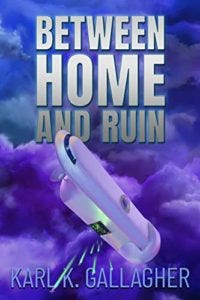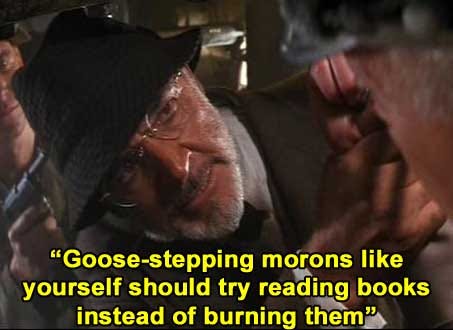During Karl Gallagher’s Torchship trilogy, I noted that he is as good as David Weber in the realm of space combat. It helps that he’s a rocket scientist.
With Karl’s previous book, Storm Between the Stars, he decided to show off his world building, with a little bite of weaponized physics at the end.
With the sequel, Between Home and Ruin, Karl just wanted to show off.
Make a book that’s 25% world building / culture shock with some diplomacy and politicking? Sure.
Make the next 40% about logistics and a murder mystery thrown in? No problem.
The last 35% nothing but non-stop space battle? Why not?
And Karl makes it look so easy.
The story
In Storm Between the Stars, we followed a trade ship crewed by the Landry family. Much of that book focused on the father, Captain Niko Landry, as the crew explored the strange new space of the Censor—a space empire that has all the worst traits of George Orwell and Fahrenheit 451. I’d throw in the French Revolution, but those guys are amateurs compared to the Censor.
Between Home and Ruin focuses on the son, Marcus Landry, during his return trip. After the events of Storm Between the Stars, the crew reported to their government about contact with the Censor. The Landry’s home system has decided that the opening step is to open negotiations, and has taken (most of) the original crew (and their ship) to haul an entire embassy full of diplomats to the Censor. And after a while, his wife, the local Wynny, takes up a lot of heavy lifting in the book.
What follows is impressive, in part because everything advances the plot and contributes to world building at the same time. Even the recap of events from the last book service the plot, since most of it is to make the new characters understand exactly what the events on the ground really look like. And forget “Chekov’s gun,” this is more like Chekov’s weapons depot. I haven’t seen a story this well structured since Die Hard.
When we get to the combat, I must admit that I haven’t seen space battles this good since Timothy Zahn wrote Grand Admiral Thrawn. And Karl spends his time on only two ships during combat. Everything is either from the point of view of one freighter converted into a gun boat, or a capital ship. And if you told me you could make a large space battle tense just by restricting it to reports on a bridge, or capturing a space dog fight with fighters just by reporting what’s on the screen, I wouldn’t have believed it.
All in all, Karl has captured a book filled with readable and entertaining diplomatic negotiations, politics of warfare, cultural clashes en masse, interstellar warfare, a romance thread that I didn’t mind, and a murder mystery thrown in for fun.
The characters
The characters carry this book. Amazingly enough, half the book is carried by Marcus' wife, Wynny. Out of necessity during the book, she must solve a murder mystery, and it's surprisingly gripping. It’s not a surprise because I doubt Karl's writing abilities, but because it's a murder mystery thrown into the middle of a military SF novel.
The world
I also haven’t seen this much visible intersection of culture impacting warfare since Victor Davis Hanson wrote Carnage and Culture. The Censor kills culture by making certain that any created work is destroyed with the author’s death—which becomes a problem when it comes to writing military textbooks. Heh heh heh. Also, they get to learn the hard way what happens when their military hierarchy is run with political officers on hand.
The world building ties into the plot so much, it's mind blowing. Like trying to introduce Christianity to a world where oral tradition names God Harold (old joke: Harold be thy name”) turns into a plot point. Even a three page description of a local movie turns two seemingly unrelated “throwaway scenes” into a plot arc.
The politics
I can sum up the politics in one image.
Content warning
There will be waterboarding as well as large-scale epic military battles.
Who is it for?
Between Home and Ruin is for anyone who enjoys old-school David Weber, military scifi Baen novels, or who wants to see brilliant world building translating into gripping action.
Why read it?
There are plenty of reasons to read it. It's fun. It's brilliant writing. It's a novel without one wasted word.





